When Paul embarked on his third missionary journey, Ephesus was the first city he visited. He had briefly visited Ephesus during his second missionary journey and had started a church there (Acts 18:19-20), but he now wanted to return and spend plenty of time teaching and training the Christians in Ephesus what it meant to follow Jesus and be the church in their community.
Acts 19:10 records that he spent about two years teaching them about Jesus. During this time, many miracles were performed, many people were healed, and many people were delivered from evil spirits (Acts 19:12).
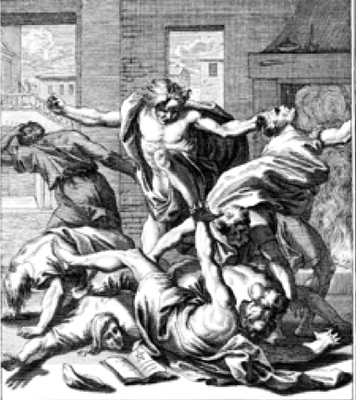 Near the end of Paul’s time in Ephesus, some itinerant Jewish teachers came to town and heard what Paul was doing, and so decided to start their own little deliverance ministry by casting out demons in the name of Jesus.
Near the end of Paul’s time in Ephesus, some itinerant Jewish teachers came to town and heard what Paul was doing, and so decided to start their own little deliverance ministry by casting out demons in the name of Jesus.
This group developed a following and even had some success, so that some of them became known as the Seven Sons of Sceva. One day the Seven Sons of Sceva were holding one of their deliverance ministry crusades in a local household, and they commanded a demon to come out of a person “in the name of Jesus whom Paul preaches” (Acts 19:13-14).
“The evil spirit answered and said, ‘Jesus I know, and Paul I know, but who are you?’” (Acts 19:15). Then the man who had the evil spirit leaped upon the seven sons, overpowered them all, beat them up, stripped them naked, and chased them out of the house, wounded and bleeding.
Word about this spread among the town, and many people became Christians as a result. These Seven Sons of Sceva had attempted to wrestle wicked forces, and had suffered a humiliating defeat. But Paul was successful and so the message of the gospel spread and grew within Ephesus.
It is quite likely that many of the Christians to whom Paul writes the letter of Ephesians had become Christians as a result of this incident. Almost all of them undoubtedly knew about the incident.
And so when Paul writes in Ephesians 6:12 about wrestling wicked forces, all of his readers in Ephesus would have perked up their ears, because they know how serious it is to wrestle evil spirits in the wrong way. They don’t want to end up like the Seven Sons of Sceva; they want to be successful like Paul.
Wrestling
Paul writes in Ephesians 6:12 that he wants his readers to wrestle against wicked spiritual forces. Some Bible translations use the word “struggle” but the Greek word is palē, which refers to the ancient sport of Greco-Roman wrestling, and so the word “wrestling” is the best translation.
Initially, the word is a bit confusing. After all, four times in Ephesians 6:10-13, Paul wrote that we should stand against the devil. We must stand our ground, and make it our goal to just stand on the ground that Jesus has won for us. But now Paul writes about wrestling.
And when you think about wrestling as two men or two boys grappling with each other and rolling about on the ground trying to pin one another to the ground, it does get seem a bit confusing. The way most of us think about wrestling, there doesn’t seem to be a whole lot of standing involved.
But Paul was not writing about modern wrestling. He was writing about how wrestling was performed in his day as practiced by the Roman soldiers.
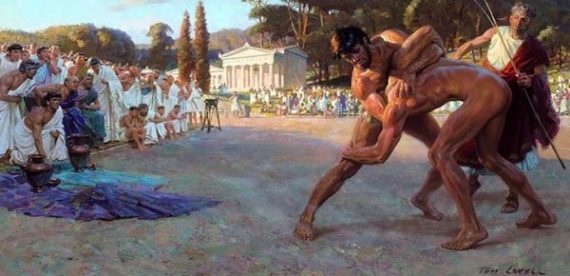
One of the favorite pastimes of the Roman soldier was Greco-Roman wrestling.
Greco-Roman wrestling is the oldest sport on the planet, with ancient cave drawings suggesting that competitions may have been held as far back as 3000 BC. But the sport was not just a pastime for the Roman soldier, it also helped train them for battle.
The rules have changed a bit over the centuries, but in Paul’s day, there was only one rule to winning in Greco-Roman wrestling. The only way to win in ancient wrestling was to stay on your feet. There weren’t all the elaborate rules of points and pins. The goal was to stay on your feet and throw your opponent to the ground three times.
So Paul’s description of wrestling against wicked forces is completely consistent with his instruction to stand our ground. The goal of wrestling was to stay on your feet, to stay standing, and so the two concepts are not contradictory, but complementary. Both phrases mean the same thing. When we wrestle wicked forces, we are to stand on our feet while we throw our foe to the ground.
In fact, the Greek noun for wrestling is palē and the verb form of the word is pallō. The verb means “to throw or swing.” So in wrestling, the goal is to throw the enemy down. This is similar to what the Bible teaches elsewhere. Over in 2 Corinthians 10:4-5, Paul writes that in this battle, one of our goals is to pull down strongholds, and to throw or cast down arguments and everything that is against God and the Word of God.
So that is what Paul had in mind here. Stand on your feet, and wrestle, struggle, throw down, cast down the enemy because he is trying to cast you down. He is trying to throw you down with his wiles, tricks, and traps, but as long as we are aware of what he is sending our way, we can stand our ground and throw him to mat instead.
The great thing about wrestling is that even if you’ve been knocked down a few times, this doesn’t mean the wrestling match is over. In ancient Roman wrestling, your opponent had to throw you down three times before you lost.
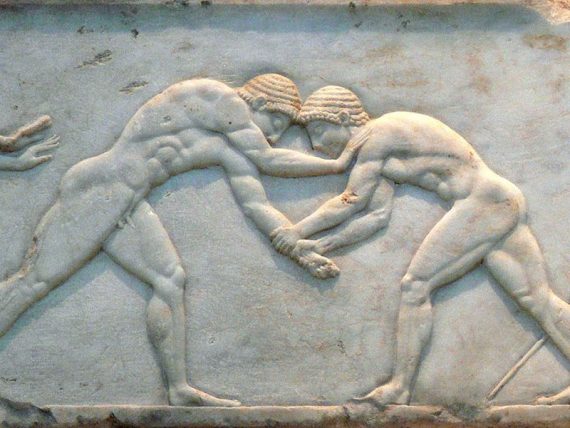
But in Christianity, due to God’s infinite grace, you can be thrown down any number of times, and as long as you get back up to continue the fight, you have not lost. Remember, Peter denied Jesus three times, and yet after Jesus rose from the dead, Jesus forgave Peter and restored him so that he could help lead the church in Jerusalem. So no matter how many times you’ve been thrown down on the mat, make sure that you get up one more time than you’ve been thrown down.
Victory in the Christian life only comes through great pain and sweat and effort. The Christian life lived correctly is not one of ease and comfort. If your life is one of ease and comfort, chances are, you are not living as a Christian should.
Do you ever feel like you can’t go on? Take just one more step. Do you ever feel too tired, too weary, too beaten, too battered to continue standing? Just stand another minute more. Do you ever feel as if any moment, you might fall? Do not give up, for in due time, your enemy’s foot will slip (Deut 32:35).
And if you do find yourself thrown on the mat by the enemy, stand back up, get in your defensive stance, and keep wrestling. Sometimes, the best wrestlers can struggle against one another for hours without either one gaining the upper hand. Back in the Olympics of 1912, held in Stockholm, Sweden, the silver medal wrestling bout lasted for 10 hours and 15 minutes. The match isn’t over until the bell rings—or in our case—until the trumpet sounds.
And as you struggle and wrestle against the enemy, listen to the roars of the watching crowd. We are, after all, surrounded by a great cloud of witnesses who are cheering us on as we wrestle against our ancient foe.
And the bout is almost over. The Bible tells us that our enemy cannot place any hold upon you from which you cannot break free. There is always a way of escape (1 Cor 10:13).
So stand on your feet and wrestle, until you gain the victor’s crown.
Let us turn now to learn everything we can about the wicked forces we wrestle against.
Wicked Forces
The wicked forces Paul mentions in Ephesians 6:12 want to make you think that they are a strong tower, or that they tower over you, but the Bible tells us, as we will see by the end of today, that although they seem to be a forbidding force, they have built on a faulty foundation, and so their tower will fall before the power of God and the army of the church.
We have nothing to fear from them.
The word against is found six times in Ephesians 6:11-12. Paul uses the word so frequently because he wants to remind us of the intensity of the battle. We are facing an enemy is completely against us and so we must be against them. There is no possibility of compromise or negotiation (cf. 1 Cor 6:14-17).
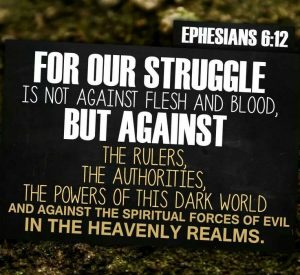 We must stand against the devil and his minions with every ounce of our effort and being. When it comes to this battle between the soldiers of Christ and our enemy of darkness, there is no common ground. There is no compromise. There is no peace process. The two sides are totally against one another.
We must stand against the devil and his minions with every ounce of our effort and being. When it comes to this battle between the soldiers of Christ and our enemy of darkness, there is no common ground. There is no compromise. There is no peace process. The two sides are totally against one another.
Paul begins, not by telling us who we are struggling against, but by reminding us who we do not struggle against. Paul says we are not wrestling against flesh and blood. This is a reference to other humans. Throughout Scripture the term flesh and blood is used as a way of referring to other members of the human race (Gal 1:16; Heb 2:14).
This will be significant as we consider the other terms, for all the other terms in Ephesians 6:12 can refer to human beings. But Paul says, “No. As I list these titles that we struggle against, don’t think of the human beings that you identify with these titles. Instead, recognize that there are powers or forces behind the human beings which have enslaved and captivated them. As we wrestle with the powers, our goal is not to defeat the human beings, but to liberate and free them.”
This is critical for us to recognize when we think of our foe on the field of battle. When most people think about their enemies, they think of humans. They imagine people of other countries, other religions, other races, other tribes, other economic classes, other families, other political parties, and other gangs. Some view the police as enemies, while the police view criminals as enemies. Whenever you wish that harm would fall upon someone else, you are thinking about them as your enemy.
But people are not our enemy.
It doesn’t matter who they are, what they believe, and how they behave. Though we may fight against other people in the family room, argue with coworkers at our jobs, sue one another in a court of law, disagree with each other in the political arena, or even sometimes kill each other in the deadly combat of war, the people in these conflicts are not our enemies.
Yes, they may engage in violence against you and do all sorts of hateful and hurtful things toward you, but they only do such things because they are trapped and enslaved by the true enemy. And when we treat them like our enemy, we are showing that we too are enslaved and deceived by our true foe.
Yet don’t be relieved. Though our struggle is not against flesh and blood, our true foe is much more fearsome and sinister. In the rest Ephesians 6:12, Paul writes that we wrestle “against principalities, against powers, against the rulers of the darkness of this age, against spiritual hosts of wickedness in the heavenly places.”

Notice that Satan is not listed here. But the devil was listed with the very first use of against back in Ephesians 6:11, where we read that we are to stand against the wiles of the devil. So this is the first title we want to look at. The word devil is the Greek word diablos. The Hebrew equivalent is satan. The word mean accuser, adversary, slanderer, or one who stands against others. The titles often carry the connotation of a prosecuting attorney who seeks to condemn and accuse people in a court of law.
Satan, or the devil, is the spirit of accusation in this world. It is the spirit of condemnation and false judgment. It is the spirit that tempts us to judge between right and wrong, when such judgments belong to God alone.
But moving on from Satan, Ephesians 6:12 lists the four titles of spiritual forces we must stand against. They are the entities that carry out the work of the devil on earth.
Principalities
The first title listed in Ephesians 6:12 is principalities. This is the Greek word archē, which literally means “beginning,” but when used in connection with people, it refers to their rulers or principle leaders.
Indeed, the word refers to the authority figures of human groups. In numerous places throughout Scripture and other Greek literature (cf. Titus 3:1) the word is used to describe earthly rulers, kings, governors, or magistrates. Indeed, the term almost never refers specifically to evil spirits or demons, but instead to human leaders and rulers.
Now since the word most often refers to human leaders and rulers, it would be tempting to think that Paul is saying that we must struggle against evil human rulers.
But Paul has already told us that this is not the case. Our struggle is not against flesh and blood. We are not wrestling against human rulers. And yet, the word clearly refers to human rulers. So what does Paul mean?
He means that there are powers, systems, traditions, structures, laws, and permissions that lie behind every earthly ruler, and it is against these that we struggle. They are the spoken or unspoken rules and cultural norms by which we allow certain people, groups, or institutions to tell others what to do.
The human leaders are just as blindly enslaved to them as everyone else, and so as we struggle against these power structures, we seek to liberate both the ruler and the ruled from the set of crushing rules that enslave us all.
So as you think of the way some governments, rulers, kings, and authorities misuse, abuse, and subjugate the people under their rule for their own benefit, this is the power of the archē, or principalities, at work. We are to struggle against such power structures as we seek to liberate and free people so that all can become who God wants them to be through liberty, love, and justice.
Powers
The second term in Paul list is powers. The Greek word is exousia, and powers is a fine translation, but it could also be translated as “authorities.” It is a close synonym to archē, refers to the permissions and structures which allow persons in power to rule.
It specifically has in mind the power of decision making and law making. Together, principalities and powers are “human power arrangements,” such as political, religious, and economic structures and leaders. The terms refer to both the power of the rulers and the way these rulers make laws and govern people.
Rulers
The third title is the rulers of the darkness of this age. The word for rulers is kosmokratoros, and is used only here in the New Testament. It is made up of two words, kosmos, meaning “world,” and the verb krateō, meaning “to control, seize, or rule.” So the kosmokratoros are the world rulers, or world forces that dominate this world.
Interestingly, the verb krateō is related to the noun kratos, which was referenced back in Ephesians 6:10 (as “might”). Kratos was also the Greek god of war. So when Paul refers here to kosmokratoros, he might be thinking of the world forces and domination systems that lead humans toward warfare and violence.
Indeed, Paul goes on to describe these world rulers as being of the darkness of this age. The concept of darkness as it relates to this age has a rich imagery in Scripture, beginning with Genesis 1:2 (in the LXX) and the oppressive and ominous darkness that covered the face of the earth.
Metaphorically, the word refers to the moral and spiritual ignorance that darkens the minds of unbelievers (cf. Acts 26:18; 2 Cor 4:4-5; Eph 4:17-18; 5:8, 11). Scripture often equates this darkness with the human inclination toward violence and warlike behavior that leads to death (Matt 4:16; Luke 1:79; 22:53; John 3:19).
This theme of the darkness that blinds people about the ways of God and leading them instead toward violence against one another fits perfectly with the mythical imagery of Kratos, the god of war. Kosmokratoros is the world-dominating spirit of war and violence that rules this age.
We can think of Daniel 10:13, 20 which tells us that in Daniel’s day, the Persian and Greek empires were controlled by two angels who were attempting to prevent God from carrying out His plans. Both the Persian and Greek Empires wanted to control the world. Hitler and Napoleon both wanted to control the world, so they possibly could fall under this category.
But it is not just power hungry emperors and dictators who can be identified with this title, for once again, it is not the human leaders themselves who are identified by this title, but the violent power behind the rulers. This would include any political rule, economic policy, or educational system that exert power toward a stance of violence and war against the people of this world.
Religious institutions would be included in this as well. Even churches even be influenced and identified with the kosmokratoros. Any church that calls for violence, warfare, or hatred toward other religious groups of sets of people has fallen prey to this fallen and evil power.
As long as our minds are blinded to the truth of God’s love, forgiveness, grace, and mercy toward all, we will be tempted to encourage violence and wage war against others. Only when we learn the truth revealed by Jesus on the cross about ourselves and about God, and how to live in this world, will war end and violence cease. We, as followers of Jesus, must struggle and wrestle against all kosmokratoros that lead us toward hatred and violence against others.
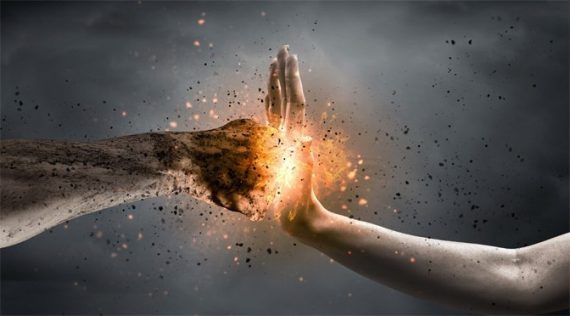
Spiritual Hosts
The fourth and final term, spiritual hosts of wickedness in the heavenly places, reminds us that there are scores upon scores of these wicked enemies. The word hosts is not actually in the Greek text, but is provided for clarity. Since the theme of the text is about spiritual warfare, it might have been better to supply a militaristic word, such cohorts, legions, or battalions.
The term that is in the Greek is pneumatika. Curiously, pneumatika is usually related to spirit-filled people and their use of spiritual gifts in serving others (1 Cor 2:15; 9:11; 14:1). But here, the word is modified with the noun ponērias, which means “wickedness” or “evil” (cf. Matt 22:18; 1 Cor 5:8).
So while we, as spirit-filled people, are good pneumatika, these beings against whom we fight are evil pneumatika. While we fight with the power of the Holy Spirit, these beings fight with the power of evil spirits.
This contrast being our holy spirituality as Christians and the evil spirituality of our foe is further made with the descriptive term in the heavenly places at the end of Ephesians 6:12. As a result of this description, some people think that spiritual warfare is taking place in heaven itself, so that the hosts of wickedness are battling angels in the spiritual realm only.
Support for this idea is found in Job 1–2 where Satan enters the courtroom of God to challenge God about the righteousness of Job, and in Revelation 12:7-17 which describes this war in heaven between the angel Michael, the dragon, and the two sets of angels that follow both. But this is not what this phrase in the heavenly places means.
The phrase has already been used several times in the letter to the Ephesians (cf. 1:20; 2:6), and in each case, it refers to the spiritual reality that consists of life with God here and now on this earth. The phrase does not refer to what occurs in heaven itself, but to what occurs when the rule and reign of heaven takes root upon this earth. It has in mind the words of Jesus from Matthew 6:10, where He prayed that God’s will would be done on earth, as it is done in heaven.
So while the phrase in the heavenlies does refer to a spiritual reality, it refers to the spiritual reality as it is seen can carried out in the physical realm, here on this earth, during our lives now.
Far too often, Christians focus so much on eternity and the afterlife, that they neglect the work that God has called us to do here and now in our lives. As someone once said, “Some Christians are so heavenly minded, they are no earthly good.” When this happens, we allow the spiritual hosts of wickedness to have their way on their earth.
As Christians, we are seated with Christ in heavenly places so that we can rule and reign with Christ here on earth, not only in the future, but also (primarily!) during our lives now. The battle is a spiritual battle, but it has far-reaching ramifications and consequences in the physical world.
We do battle in the spiritual world by seeking to help people in the physical world.
These spiritual hosts of wickedness are seeking to destroy people’s lives, inhibit the truth of the gospel from spreading upon the earth, and hinder the effectiveness of the church. We struggle against these forces with all our might so that lives can be saved, the gospel can spread, and the church can serve others in this world. The struggle is spiritual in nature, but physical in how it manifests in this world.
Thankfully, Jesus, our Commanding Officer, fights with us in this battle, telling us where to go and what to do so that we can be successful against our foe. The truth of Ephesians is that we, as the followers of Jesus, have been specially called and gifted to carry out the will of God on earth, just as God’s will is carried out in heavenly places.
It remains the church’s task not only to proclaim to people that they have been redeemed from the darkness that once held them in bondage, but also to proclaim to the Powers that they are not supreme. That Christ is their sovereign.

Do you want to wrestle against wicked forces? We have learned a bit in this study about who these forces are. In previous studies, we have learned that our primary task in spiritual warfare is to stand our ground against these wicked forces.
One of the primary ways we do this is by putting on the full armor of God. It is to this idea we turn in the next study…
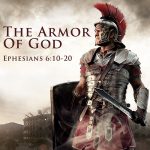 Do you want to learn about spiritual warfare and how to put on the full armor of God? If you want to defeat sin and gain victory in your life over temptation so you can better follow Jesus, take my course on the Armor of God as it is explained in Ephesians 6:10-20.
This course costs $297, but when you join the Discipleship group, you can to take the entire course for free.
Do you want to learn about spiritual warfare and how to put on the full armor of God? If you want to defeat sin and gain victory in your life over temptation so you can better follow Jesus, take my course on the Armor of God as it is explained in Ephesians 6:10-20.
This course costs $297, but when you join the Discipleship group, you can to take the entire course for free.




Thank you! I haven’t heard much teaching on spiritual warfare in my 40+ years in various churches. Saving this for future reference.